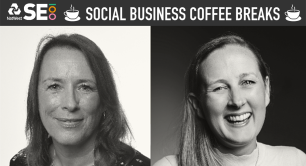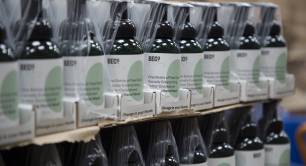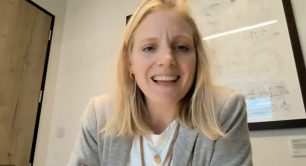‘When we design for disability, we are actually designing for us all’: how to champion disability in your social enterprise
Social Business Coffee Breaks: Disability advocates from across the UK’s impact sector share their thoughts on how social enterprise leaders can make their businesses more inclusive and accessible for disabled employees and consumers.
Challenging perceptions of disability, increasing dialogue about disability, and taking action to make social enterprises more accessible for disabled people. These were the key takeaways from this week’s webinar on ‘How to champion disability in your social enterprise’, hosted by Tim West, founding editor of Pioneers Post.
The second webinar in the new SE100 Social Business Coffee Breaks series, run by Pioneers Post in partnership with NatWest Social & Community Capital, heard from a panel of inspirational disability advocates about their own experiences as campaigners and social entrepreneurs, and their advice on how other social enterprises could take positive action.
The speakers included Dr Lucy Reynolds, chair of Disability North and founder of We Are All Disabled, a Community Interest Company that aims to challenge and change perceptions of disability through events, training, and consultancy. Lucy was joined by her colleague Julia James, life coach and also a director of We Are All Disabled. Also speaking on the webinar were Dr Kush Kanodia, a social entrepreneur, disability rights advocate and Paralympic Games torchbearer, and Salma Perveen, associate with The Diversity Forum, a collective set up and funded by Connect Fund in 2018 to drive inclusive social investment in the UK.
The one constant in these mid-morning webinars is the coffee. Not just any coffee, but coffee produced specifically by a social enterprise. Keeping with the theme of this month’s webinar, Tim drank coffee brewed by Team Domenica, a charity and Specialist Further Education College set up in 2016 by Rosa Monckton MBE, whose daughter Domenica has Down’s syndrome. Based in Brighton & Hove, and across Sussex, the organisation provides young people with learning disabilities access to training programmes and employment opportunities in their roastery and across their cafes.
Two representatives from Team Domenica, coffee manager Joel Goss and head of fundraising Greg van Heeswijk, also joined the beginning of the discussion. Greg van Heeswijk said that the national average of people with learning disabilities finding paid work, according to NHS Digital, is 5.1%, but for Team Domenica’s programmes, it’s 81%. “It’s something that really works,” he added.
Also joining the webinar was Megan Virrels, special adviser at NatWest Social & Community Capital, who said that the timing of the webinar was particularly apt as it took place so close to 3 December, the International Day of Persons with Disabilities.
She also said that the subject was “close to my heart” as her husband is now disabled after he developed chronic fatigue, and earlier this year was made redundant from his job. “So championing the talents and experiences of people with disabilities is something that’s very important to me,” she added.
Challenging perceptions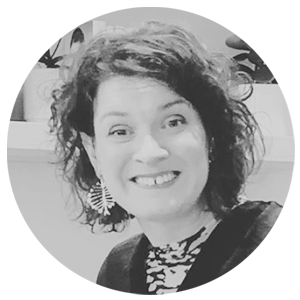
Changing how people perceive disability is at the core of making institutions more inclusive for disabled people, emphasised the speakers in the webinar. Dr Lucy Reynolds, who has cerebral palsy, initially started ‘We Are All Disabled’ as a blog, aiming to encourage people to “embrace disability and think about the positives that disabled people can bring”.
Her colleague, Julia James, acknowledged that though the title of the blog is “quite a controversial statement”, there is a deeper meaning to it. “What we're recognising is that we all potentially have something that may limit our ability to participate and that might be lots of different things,” she said. She added that the phrase “helps people to get comfortable with being uncomfortable”.
Dr Kush Kanodia, who was diagnosed with multiple epiphyseal dysplasia as a child, and had to get hip replacement surgery that “knocked out a year of [his] life” as an adult, urged people to think about disability through the lens of the social model of disability, instead of the medical model. He said: “The medical model of disability essentially states that it’s our impairment that disables us. The social model of disability, which the disability rights movement focuses on and which I believe is the key tool for the emancipation of disabled people, actually states that it’s barriers in society that disables us and negative attitudes.”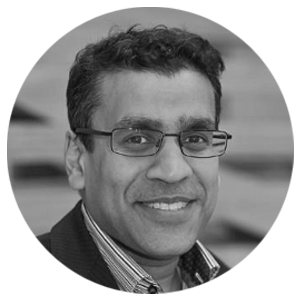
He added: “What I realised was I can’t just keep replacing joints in my body. It’s not me who needs to be fixed. I’m perfect the way I am. But we need to make some structural changes in society.”
Kanodia also expounded on Reynolds’ and James’ point about disability being something that we should all relate to. He said: “Following on from the wonderful name ‘We Are All Disabled’, I wanted to just say that we will all experience disability in some shape or form in the future, and this will either be through our own personal experiences, or through our friends and family. Over 80% of disabilities are acquired during one’s working age and there is a correlation between disability and getting older. So when we design for disability, we are actually designing for us all.”
Creating honest dialogue
Another takeaway that all the speakers highlighted was the power of conversation. In order to transform how disability is perceived, we have to first speak about it, instead of shy away from it, Reynolds emphasised. She said: “Listen to disabled people in order to have conversations that can make things happen.”
She added that, due to her difficulties with speech, when in public people “would rather ignore [her] and pretend [she] wasn’t there”, which was “a real shame”. Instead of people assuming that she didn’t want to be addressed to avoid any awkwardness, she urged: “Please ask, because I wouldn't mind.”
Elaborating on this, James said: “People are terrified of saying or doing the wrong thing.” Using herself as an example, she said: “When Lucy and I first started working together, I would sometimes, rather embarrassingly, pretend that I’d understood her when I hadn’t. But she caught me out every time. She’d often ask a quick question, and I’d have to admit and say ‘Actually, no, I didn’t get that.’”
“I think that one of the one of the really positive things we found with COVID was that it really seemed to have helped open up those sorts of conversations,” she added.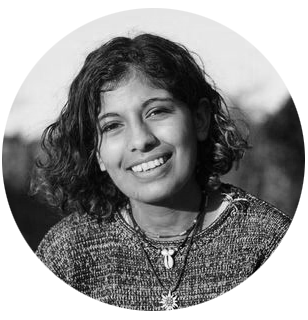
Reflecting on James’ example, The Diversity Forum’s Salma Perveen said there is a “kind of vulnerability”, “safety” and “honesty” needed in such dialogue. “Having meaningful conversations with people with lived experience of disabled disability and also with disabled social entrepreneurs” is the way to “create change”, she said.
The most important thing is that everyone recognises that individual agency in creating change. You don’t have to change the whole system overnight
Taking action
The final piece of advice offered by the speakers was to transform perceptions and dialogue into action, no matter how small-scale it was. Perveen said: “I just think the most important thing is that everyone recognises that individual agency in creating change. You don’t have to change the whole system overnight. You can build your way up to doing something.”
Kanodia argued that businesses actually stand to increase demand for their products and services by making them more accessible to disabled people. He said: “I think sometimes we look at disability as just the cost and I think that’s really wrong. The purple pound highlights the purchasing power of disabled people. We estimate there is a population of 1.85 billion disabled people globally. That’s a population larger than China that controls $13 trillion of disposable income.”
He added: “If you look at the biggest organisations in the world, the big tech companies, they implement universal design principles. Why would you create products and services that are only accessible for 80% of society? It doesn’t make any sense. Create something that’s accessible and inclusive for all and then it’s a more sustainable product lifecycle.”
Adding to the list of actions social enterprise leaders can take to champion disability in their businesses, Perveen said that employers should undergo “the Disability Confident scheme”, incorporate the consultancy advice of organisations like We Are Disabled CIC into their “Equality, Diversity and Inclusion (EDI)” plan and “commit to doing training or an audit”.
“It’s really really important to not just kind of speak about [disability inclusion] and say ‘This is a nice thing’ but to actually work as an organisation to create meaningful change,” she said.
Organisations, links and resources:
 International Day of Persons with Disabilities
International Day of Persons with Disabilities
 Diversity Forum and Diversity Forum Toolkit
Diversity Forum and Diversity Forum Toolkit
 A digital world accessible to all. | AbilityNet
A digital world accessible to all. | AbilityNet
 Greater London Regional Stakeholder Network – Disabled voices of Greater London
Greater London Regional Stakeholder Network – Disabled voices of Greater London
 London Health Inequalities & Community Development Network - Volunteering Matters
London Health Inequalities & Community Development Network - Volunteering Matters
 Inclusion London - Promoting equality for London’s Deaf and Disabled people
Inclusion London - Promoting equality for London’s Deaf and Disabled people
Thanks for reading our stories. As an entrepreneur or investor yourself, you'll know that producing quality work doesn't come free. We rely on our subscribers to sustain our journalism – so if you think it's worth having an independent, specialist media platform that covers social enterprise stories, please consider subscribing. You'll also be buying social: Pioneers Post is a social enterprise itself, reinvesting all our profits into helping you do good business, better.







